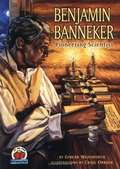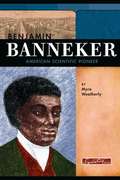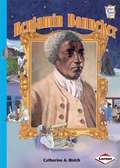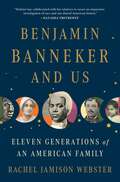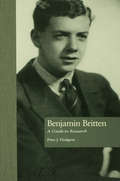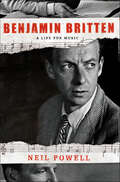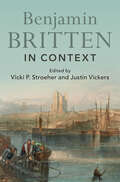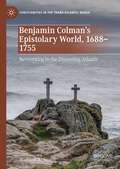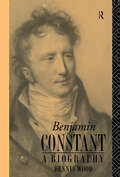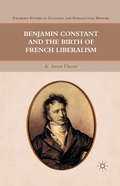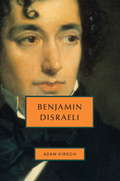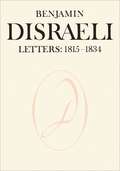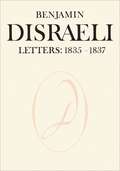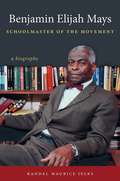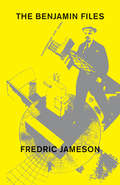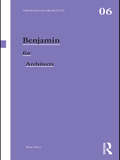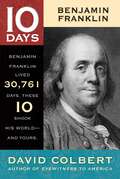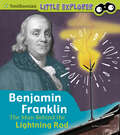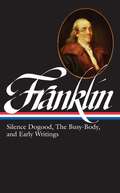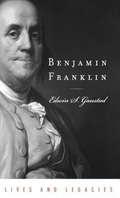- Table View
- List View
Benjamin Banneker: Pioneering Scientist
by Ginger WadsworthIntroduces Benjamin Banneker, a free black man of the eighteenth century who loved to learn and used his knowledge and observations to build a wooden clock, write an almanac, and help survey the streets of Washington. D.C.
Benjamin Banneker: American Scientific Pioneer
by Myra S. WeatherlyA biography profiling the life of scientist and mathematician Benjamin Banneker. Includes source notes and timeline.
Benjamin Banneker
by Catherine A. WelchAn introduction to the life of Benjamin Banneker (1731-1806), known as the first major African American scientist. Banneker was a mathematician and astronomer. He published almanacs, built clocks, and surveyed the land that became Washington, D. C. He was also an outspoken opponent of slavery.
Benjamin Banneker and Us: Eleven Generations of an American Family
by Rachel Jamison WebsterA family reunion gives way to an unforgettable genealogical quest as relatives reconnect across lines of color, culture, and time, putting the past into urgent conversation with the present.In 1791, Thomas Jefferson hired a Black man to help survey Washington, DC. That man was Benjamin Banneker, an African American mathematician, a writer of almanacs, and one of the greatest astronomers of his generation. Banneker then wrote what would become a famous letter to Jefferson, imploring the new president to examine his hypocrisy, as someone who claimed to love liberty yet was an enslaver. More than two centuries later, Rachel Jamison Webster, an ostensibly white woman, learns that this groundbreaking Black forefather is also her distant relative.Acting as a storyteller, Webster draws on oral history and conversations with her DNA cousins to imagine the lives of their shared ancestors across eleven generations, among them Banneker’s grandparents, an interracial couple who broke the law to marry when America was still a conglomerate of colonies under British rule. These stories shed light on the legal construction of race and display the brilliance and resistance of early African Americans in the face of increasingly unjust laws, some of which are still in effect in the present day.
Benjamin Britten: A Guide to Research (Routledge Music Bibliographies)
by Peter J. HodgsonThis work constitutes the largest and most comprehensive research guide ever published about Benjamin Britten. Entries survey the most significant published materials relating to the composer, including bibliographies, catalogs, letters and documents, conference reports, biographies, and studies of Britten's music.
Benjamin Britten: A Life for Music
by Neil PowellThis spellbinding centenary biography by Neil Powell looks at the music, the life, and the legacy of the greatest British composer of the twentieth centuryBenjamin Britten was born on November 22, 1913, in the East Suffolk town of Lowestoft. Displaying a passion and proficiency for music at an early age, to the delight of his mother, Edith, a talented amateur musician herself, he began composing music when he was only five years old. After studying at the Royal College of Music, Britten went on to write documentary scores for the General Post Office Film Unit, where he met and collaborated with the poet W. H. Auden.Of more lasting importance was Britten's introduction in 1937 to the tenor Peter Pears, who was to become the inspirational center of his emotional and musical life. Their partnership lasted nearly four decades, during a dangerous time when homosexuality was illegal in England. Conscientious objectors, Britten and Pears followed Auden to America before the war began in 1939. While there, they joined the extraordinary Brooklyn ménage of George Davis, Louis MacNeice, and Paul Bowles.Eventually intense homesickness, provoked in part by George Crabbe's poem "Peter Grimes," drove the pair home to East Anglia in 1942 and gave Britten the inspiration for his finest opera. Throughout his career, Britten did not want modern music to be just for "the cultured few" and instead always composed his music to be "listenable-to." The shared quotidian lives of Britten and Pears unfold in this intimate biography and the story of two men who created a truly remarkable legacy.
Benjamin Britten (Penguin Specials)
by Igor Toronyi-LalicBenjamin Britten was one of the most important and unusual figures in twentieth-century music. This is the perfect introduction to his many wonderful works and his fascinating, controversial life.Benjamin Britten single-handedly transformed the reputation of British classical music. The enormous popular appeal of his great works, such as Peter Grimes (1945) and the Young Person's Guide to the Orchestra (1946), make him the most successful opera composer of any born in the twentieth century. But his success was not without controversy and pain: he was accused of fleeing Britain to avoid military service, he was widely known to be sexually obsessed with boys and he suffered an astonishing array of illnesses. This short book combines a colourful overview of his life with pithy descriptions of all of his major musical works, providing an intimate portrait of this highly unusual man and a persuasive account of his influences, reputation and importance.Each chapter tackles a key episode and theme in his life, from his first compositions at the age of 5, his early friendship and collaboration with W H Auden and the beginnings of his life-long relationship with the tenor Peter Pears, through to his great musical successes and the establishment of the influential, if tempestuous, Aldeburgh Festival, as well as his failures, such as his coronation opera Gloriana (known as 'Boriana') and being satirised by Dudley Moore in Beyond the Fringe - and ending with frank discussions of his naïve politics, his troubling sexuality and his glorious musical legacy.Published to coincide with his 100th anniversary of his birth, this is the perfect introduction to a towering figure of British culture.Igor Toronyi-Lalic is a critic and curator. He writes regularly on music for, among others, The Times and Sunday Telegraph. He is a founder of theartsdesk.com, the author of What's That Thing? (2012), a report on public art, and co-director of the London Contemporary Music Festival.
Benjamin Britten in Context (Composers in Context)
by Vicki P. Stroeher Justin VickersBenjamin Britten, pianist, conductor, educator, composer of a wide range of music from large-scale operas and choral works to string quartets and songs, is acknowledged as a pivotal figure in mid-twentieth-century Britain. This volume explores the contexts for his multi-faceted career and his engagement with his contemporaries in music, art, literature, and film, British musical institutions, royal and governmental entities, and the church, as well as his ground-breaking projects, philosophical and ideological tenets. The book is thematically structured in five parts: Britten's relationships with Peter Pears, his close friends, mentors, and colleagues; musical life in Britain; his interactions with previous and contemporary generations of composers; his professional work with choreographers, librettists, stage designers, and directors; and his socio-cultural, religious, and political environment. The chapters shed light on the many opportunities and challenges of post-war British musical life that shaped Britten's creative output.
Benjamin Budge and Barnaby Ball
by Florence Parry HeideBenjamin is too big for the features of his house. Barnaby is too small for the things in his house. How do they fix their problems?
Benjamin Colman’s Epistolary World, 1688-1755: Networking in the Dissenting Atlantic (Christianities in the Trans-Atlantic World)
by William R. SmithThis book tells the story of the Rev. Benjamin Colman (1673-1747), one of eighteenth-century America’s most influential ministers, and his transatlantic social world of letters. Exploring his epistolary network reveals how imperial culture diffused through the British Atlantic and formed the Dissenting Interest in America, England, and Scotland. Traveling to and living in England between 1695-1699, Colman forged enduring connections with English Dissenters that would animate and define his ministry for nearly a half century. The chapters reassemble Colman’s epistolary web to illuminate the Dissenting Interest’s broad range of activities through the circulation of Dissenting histories, libraries, missionaries, revival news, and provincial defenses of religious liberty. This book argues that over the course of Colman’s life the Dissenting Interest integrated, extended, and ultimately detached, presenting the history of Protestant Dissent as fundamentally a transatlantic story shaped by the provincial edges of the British Empire.
Benjamin Constant: A Biography
by Dennis Wood`For forty years I have defended the same principle: freedom in everything, in religion, in philosophy, in literature, in industry, in politics - and by freedom I mean the triumph of the individual.' Constant thus summarized his beliefs at the end of his life. A political theorist and a passionate defender of individual liberty, he was also the author of one of the greatest French novels of psychological insight, Adolphe. In a major new biography Dennis Wood traces the development of Constant as a writer centrally preoccupied with the problematics of freedom, not only in the fields of politics and religious belief but also in his own troubled relationship with several women.
Benjamin Constant and the Birth of French Liberalism (Palgrave Studies in Cultural and Intellectual History)
by K. Steven VincentThis book advances a new interpretation of the timing and character of French (and more broadly European) liberalism, and contributes to the ongoing debate concerning the place of morality, sociability, and conceptions of the "self" in modern liberal thought.
Benjamin Constant's Philosophy of Liberalism: A Study in Politics and Religion
by Guy H. DodgeThis first work in English to focus on Constant as a political theorist shows that his thinking was molded by the French Revolution of 1789 and by Napoleon's regime. Constant is identified as the first to recognize Bonapartism as a new form of despotism, arising from the theory of popular sovereignty, which is still the basis for modern Fascist and Communist regimes. His political thought is analyzed within the framework of his philosophy of history, law, ethics, and religion.Originally published in 1980.A UNC Press Enduring Edition -- UNC Press Enduring Editions use the latest in digital technology to make available again books from our distinguished backlist that were previously out of print. These editions are published unaltered from the original, and are presented in affordable paperback formats, bringing readers both historical and cultural value.
Benjamin Disraeli
by Adam KirschNew York-based poet and critic Kirsch presents a biography of British novelist and politician Disraeli (1804-81) emphasizing his support for what would become Zionism and the impact of his prominence on the portrayal of Jews in Britain. No index or bibliography is provided.
Benjamin Disraeli Letters: 1815-1834, Volume I
by Benjamin Disraeli John Gunn John Matthews Donald Schurman Melvin WiebeThe private letters of a statesman are always inviting material for historians and when he has claim to literary fame as well the correspondence assumes a double significance. Benjamin Disraeli (1804-1881) belonged to an age that gave pride of place to the written word as an instrument of both business and pleasure. This volume includes 363 letters (many previously unpublished) from his school boy days to his establishment in the Tory camp under the patronage of Lord Lyndhurst. Most prominent are Disraeli's letters to his sister, Sarah, with whom he corresponded frequently over several decades. To her he confided his hopes, interspersed with his observations and descriptions of social, literary and political events. The letters to Sarah supply a skeleton around which Disraeli's young manhood can be reconstructed and shed valuable light on the remaining documents in the volume. The correspondence also includes accounts of his tour of the Low Countries and the Rhine in 1824, his adventurous trip to Spain, Greece, the Near East and Egypt in 1830, his tense negotiations with publishers and his campaign to shine as a member of aristocratic society and win political patronage. The letters demonstrate the fine eye for detail and the capacity for self-dramatization and literary conceits which mark his novels. With their annotations they also provide a remarkably detailed account of life in the upper reaches of English society as viewed from below, and of Disraeli's ambitions to enter that life.
Benjamin Disraeli Letters: 1835-1837, Volume II
by Benjamin Disraeli John Gunn John Matthews Donald Schurman Melvin WiebeThe 334 letters in this volume cover the period from Disraeli's establishment in the Tory camp under the patronage of Lord Lyndhurst to his election to parliament in 1837. The most important issue to which they speak is the course of Disraeli's political ambitions. In 1835 the road to parliament was not yet clear, for he continued to be haunted by troubles from his past. He was beset by charges of opportunism in his Taunton campaign of 1835, and the longest letters here are those to Edwards Beadon written in justification of past conduct; Disraeli had still to learn the truth of his later dictum, 'never explain.' Also, debts contracted many years before continued to plague him, as they would in years to come. He was tempted by a variety of money-making schemes and the later correspondence makes clear just how close he came to permanent ruin at the hands of his creditors in the spring of 1837. Had the fate of debtors' prison materialized it is doubtful that he would ever have been eligible, in law or in reputation, for a parliamentary career. Disraeli's eventual election for Maidstone in the summer of 1837 marked the emergence of his formal public role. Because he set out early and was a long time in attaining his goals, one is tempted to laud his patience. But the record here suggests that it was instead a matter of energy and endurance. This volume of the Letters brings Disraeli to the threshold of the Victorian era and the beginning of his career as a politician. In late 1837 he failed in his maiden speech, but all major successes lay ahead.
Benjamin Disraeli Letters
by Ellen L. Hawman Michael W. Pharand M. G. Wiebe Mary S. Millar Sandra Den OtterIn February 1868 Benjamin Disraeli became the fortieth prime minister of Great Britain. The tenth volume of the Benjamin Disraeli Letters series is devoted exclusively to Disraeli's copious correspondence during that momentous year. The volume contains 648 of Disraeli's letters, 510 of them never before published and all copiously annotated - often with the other side of the correspondence included.This volume constitutes a unique record of Disraeli's rise to power and of the inner workings of the Victorian political scene, all of it recorded in intimate detail. A vast project which the Times Literary Supplement has called "a monument to scholarship," the Benjamin Disraeli Letters volumes are an essential resource for the study of nineteenth-century politics, history, literature, and the arts.
Benjamin Disraeli Letters, 1865-1867 #9
by Michael W. Pharand Ellen L. Hawman M. G. Wiebe Mary S. Millar Sandra Den OtterThe Times Literary Supplement recently praised the Benjamin Disraeli Letters volumes as 'a remarkable series ... on its way to becoming one of the landmarks of Victorian-era scholarship.' Each volume provides a unique record of Disraeli's daily activities as well as rare glimpses into his decision-making process and his relationships with colleagues and political foes.This latest volume covers 1865 to 1867, crucial years leading up to Disraeli's first ministry in 1868. During this period, the prime minister, Lord Derby, and Disraeli, chancellor of the exchequer, grappled with a number of challenges. Their greatest accomplishment, however, was the passage of a landmark franchise reform bill that expanded the electorate in England to an unprecedented extent.The story is told through 697 letters, of which 525 have never before been published and 78 only in part. Thoroughly annotated, the notes often include the other side of Disraeli's correspondence - including many letters from Derby and Queen Victoria. Finally, this volume is cross-referenced with the previous ones to obtain as complete a picture as possible of political events during Disraeli's lifetime.
Benjamin Elijah Mays, Schoolmaster of the Movement
by Randal Maurice JelksIn this first full-length biography of Benjamin Mays (1894-1984), Randal Maurice Jelks chronicles the life of the man Martin Luther King Jr. called his "spiritual and intellectual father." Dean of the Howard University School of Religion, president of Morehouse College, and mentor to influential black leaders, Mays had a profound impact on the education of the leadership of the black church and of a generation of activists, policymakers, and educators. Jelks argues that Mays's ability to connect the message of Christianity with the responsibility to challenge injustice prepared the black church for its pivotal role in the civil rights movement. From Mays's humble origins in Epworth, South Carolina, through his doctoral education, his work with institutions such as the National Urban League, the NAACP, and the national YMCA movement, and his significant career in academia, Jelks creates a rich portrait of the man, the teacher, and the scholar. Benjamin Elijah Mays, Schoolmaster of the Movement is a powerful portrayal of one man's faith, thought, and mentorship in bringing American apartheid to an end.
The Benjamin Files
by Fredric JamesonJameson's first full-length engagement with Walter Benjamin's workThe Benjamin Files offers a comprehensive new reading of all of Benjamin's major works and a great number of his shorter book reviews, notes and letters. Its premise is that Benjamin was an anti-philosophical, anti-systematic thinker whose conceptual interests also felt the gravitational pull of his vocation as a writer. What resulted was a coexistence or variety of language fields and thematic codes which overlapped and often seemed to contradict each other: a view which will allow us to clarify the much-debated tension in his works between the mystical or theological side of Benjamin and his political or historical inclination. The three-way tug of war over his heritage between adherents of his friends Scholem, Adorno and Brecht, can also be better grasped from this position, which gives the Brechtian standpoint more due than most influential academic studies. Benjamin's corpus is an anticipation of contemporary theory in the priority it gives language and representation over philosophical or conceptual unity; and its political motivations are clarified by attention to the omnipresence of History throughout his writing, from the shortest articles to the most ambitious projects. His explicit program - "to transfer the crisis into the heart of language" or, in other words, to detect class struggle at work in the most minute literary phenomena - requires the reader to translate the linguistic or representational literary issues that concerned him back into the omnipresent but often only implicitly political ones. But the latter are those of another era, to which we must gain access, to use one of Benjamin's favorite expressions.
Benjamin for Architects (Thinkers for Architects)
by Brian ElliottWalter Benjamin has become a decisive reference point for a whole range of critical disciplines, as he constructed a unique and provocative synthesis of aesthetics, politics and philosophy. Examining Benjamin’s contributions to cultural criticism in relation to the works of Max Ernst, Adolf Loos, Le Corbusier and Sigfried Giedion, this book also situates Benjamin’s work within more recent developments in architecture and urbanism. This is a concise, coherent account of the relevance of Walter Benjamin’s writings to architects, locating Benjamin’s critical work within the context of contemporary architecture and urbanism.
Benjamin Franklin: Benjamin Franklin (10 Days)
by David ColbertBestselling author David Colbert examines the life of Benjamin Franklin by looking at the ten most important days of his life—days that changed the world.You're about to be an eyewitness to the top ten days in Ben Franklin's life, including: -A cunning escape from a cruel brother. -A shrewd plan to save the colonies. -A treacherous spy game in Paris. -A shocking battle with a vengeful aristocrat. -And a last-minute triumph that bound American together. These days and five others shook Franklin's world—and yours.
Benjamin Franklin: The Man Behind the Lightning Rod (Little Inventor)
by Nancy DickmannWhy is Benjamin Franklin important? He invented the lightning rod and much more! Readers follow the journey of this inventor and founding father. Franklin created the lightning rod and other inventions that helped change the world. It's an electrifying story filled with engaging text and colorful images, all reviewed by Smithsonian experts.
Benjamin Franklin: Silence Dogood, The Busy-Body, and Early Writings
by Benjamin Franklin J. A. Leo LemayThe most complete two-volume collection ever published of Franklin's brilliant writings.
Benjamin Franklin
by Edwin S. GaustadThe tenth and youngest son of a poor Boston soapmaker, Benjamin Franklin would rise to become, in Thomas Jefferson's words, "the greatest man and ornament of his age. " In this short, engaging biography, historian Edwin S. Gaustad offers a marvelous portrait of this towering colonial figure, illuminating Franklin's character and personality. Here is truly one of the most extraordinary lives imaginable, a man who, with only two years of formal education, became a printer, publisher,postmaster, philosopher, world-class scientist and inventor, statesman, musician, and abolitionist. Gaustad presents a chronological account of all these accomplishments, delightfully spiced with quotations from Franklin's own extensive writings. The book describes how the hardworking Franklin became at age 24 the most successful printer in Pennsylvania and how by 42, with the help of Poor Richard's Almanack, he had amassed enough wealth to retire from business. We then follow Franklin's nextbrilliant career, as an inventor and scientist, examining his pioneering work on electricity and his inventions of the Franklin Stove, the lightning rod, and bifocals, as well as his mapping of the Gulf Stream, a major contribution to navigation. Lastly, the book covers Franklin's role as America's leading statesman, ranging from his years in England before the Revolutionary War to his time in France thereafter, highlighting his many contributions to the cause of liberty. Along the way, Gaustad sheds light on Franklin's personal life, including his troubled relationship with his illegitimate son William, who remained a Loyalist during the Revolution, and Franklin's thoughts on such topics as religion and morality. Written by a leading authority on colonial America, this compact biography captures in a remarkably small space one of the most protean lives in our nation's history.
